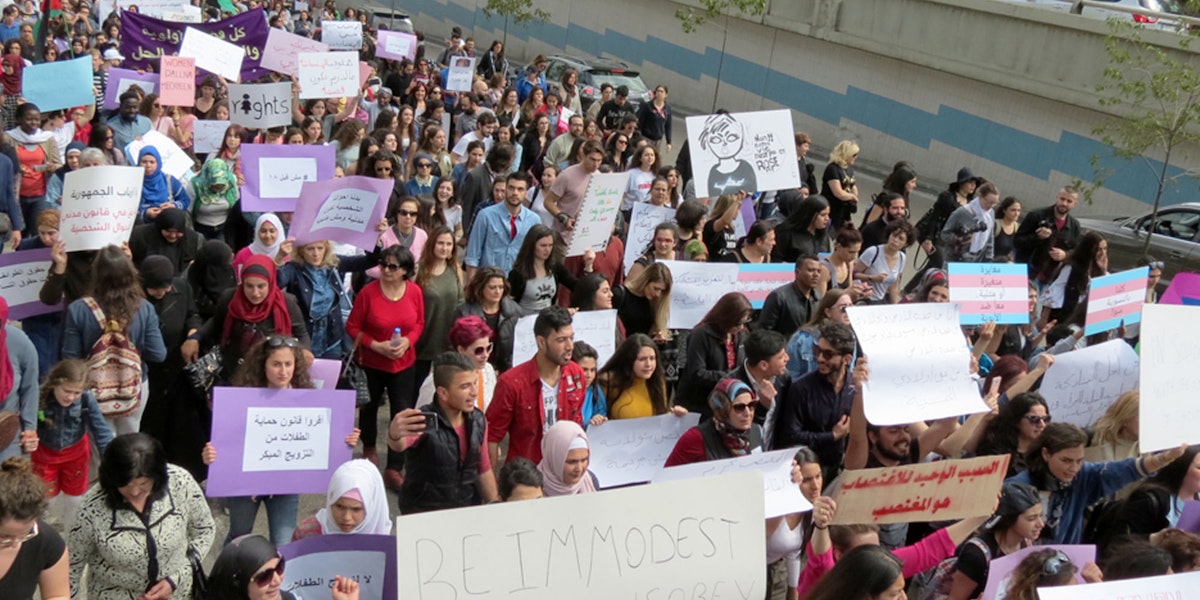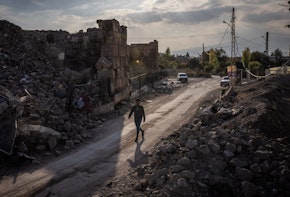In the Middle East, a new generation of feminists has tried to break out of established silos. Ghiwa Sayegh’s journal, Kohl, and her activism attempt to apply her feminism in an inclusive and interdisciplinary way. Feminists, Sayegh argues, should not limit themselves to investigating women’s rights as traditionally conceived. They should use feminism as a jumping off point for thinking about, and fighting for, a wide array of rights that intersect and overlap with feminist principles.
Sayegh is passionate about the intersections of sex and sexuality, migration, global economies, and feminist histories. Like other contemporary activists, she believes that methods are as important as goals—that thinkers and actors must create new ways of doing their work in order to renew and shift their societies. She spoke from Beirut to TCF senior fellow Thanassis Cambanis in February, 2019.
Thanassis Cambanis: How would you define feminism today through your work with your journal, Kohl? How do you see that idea breaking down or being adopted differently around the region?
Ghiwa Sayegh: I think that the way we work through our feminism is not just in the content we produce, which is obviously feminist, but also through a feminist content and structure that are also intersectional. That is kind of the broad line of feminism in which we situate ourselves. However, more than just the content we produce, Kohl engages with feminism precisely through various practices, processes, and methodologies of carrying out research, participating in work, and analyzing social structures. So we’re engaged in a form of feminist praxis—it’s not something that is fixed or rigid, but it’s an ongoing conversation that addresses different power dynamics. We also try to come up with structures that challenge intersecting status quos. Rather than solely focus on gender dynamics, we see how this intersects with issues of funding, labor rights, etc.
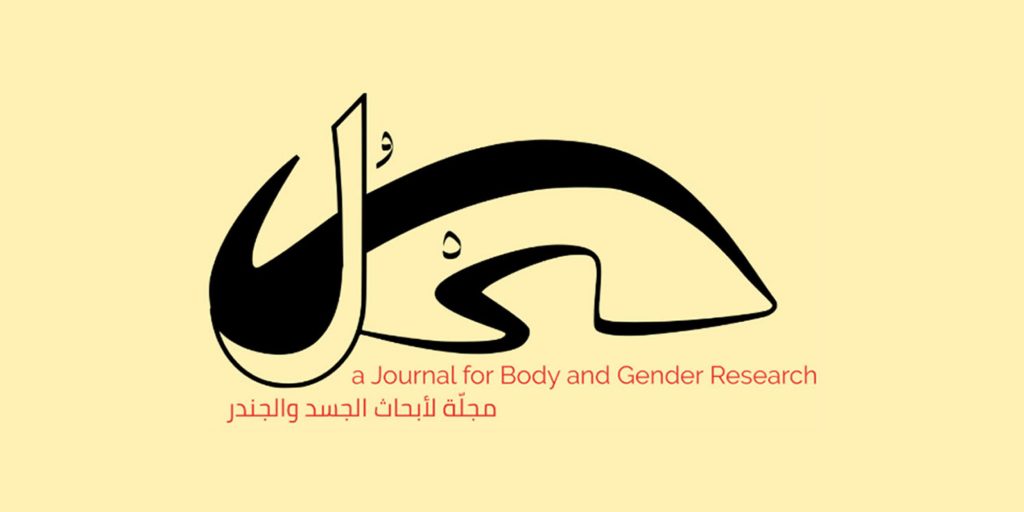
Cambanis: So you try to organize the structure of your work in a way that reflects your ideas?
Sayegh: Yes, absolutely. And it’s not just a reflection of our ideas. Our ideas are also produced through our work.
Intersectionality as a Dynamic Process
Cambanis: What ends up being different about the way you work as a result of this praxis?
Sayegh: I think what may make us different—and what makes other groups different that work in alternative ways—is the way we interlink and intersect with other movements and groups, because our understanding of solidarity is not mainstream. Rather than looking at different groups—especially migrants and other minority groups—as subjects of research or simply as beneficiaries, we understand these groups to be accomplices in the movements that we’re trying to be part of. In other words, we emphasize political agency, as opposed to viewing groups as objects of research.
Rather than looking at different groups—especially migrants and other minority groups—as subjects of research or simply as beneficiaries, we understand these groups to be accomplices in the movements that we’re trying to be part of.
Cambanis: Can you explain how you view intersectionality and how you view solidarity in relation to it?
Sayegh: The term “intersectionality” is being overused lately. Sometimes a word gets picked up and gains momentum and we’re seeing that in the region, and that could be perceived as making progress. But I think the way we work through intersectionality is slightly different, because it’s traditionally seen as kind of bringing together many issues at the same time. That’s not incorrect, but it’s not how we envision it.
For us, intersectionality is more of a dynamic process. It’s not just keeping in mind many issues or different categories, such as race, gender, citizenship, status, etcetera. It’s about understanding structural power as operating within and across these existing categories, rather than seeing these categories as atomized or isolated from one another. By structural power, I not only refer to the state and legal systems, but also to the structures that we create as feminists and activists. In doing so, we try to ask how to make space in our movements for the people that we are supposedly advocating on behalf of. How do we create research methodologies that are not just about other people, but that actually involve them? We try to center their own experiences and stories, rather than just making an argument that gets at a certain point and does not care about the people it talks about. That’s our understanding of intersectionality and the ways in which we try to work through it.
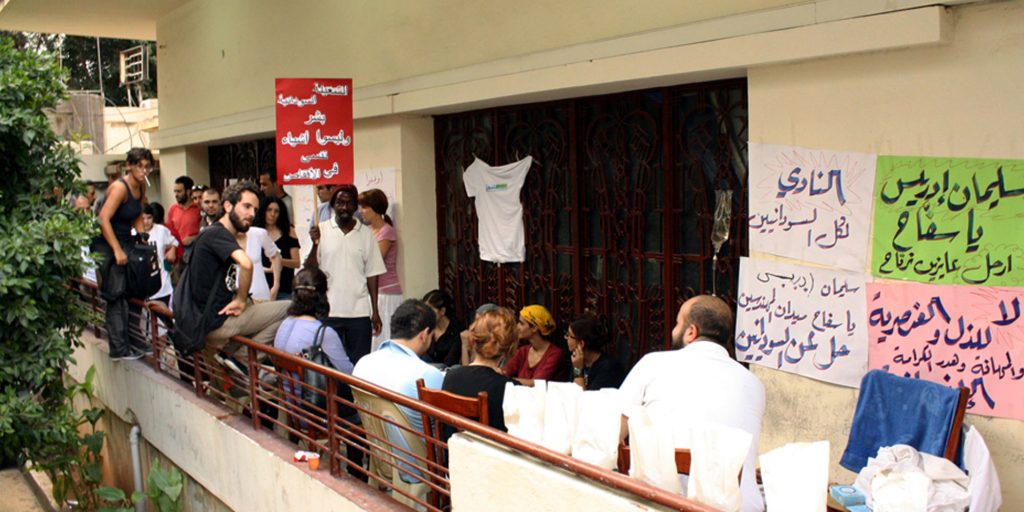
Feminism as an Ideology
Cambanis: How do you define a feminist agenda at a time when, in different arenas, we see injustice, rights-stripping, and repression all feeding off each other?
Sayegh: I don’t think it’s possible for us to separate where we apply our feminism and where we don’t. It’s not just a framework that we choose to apply at certain points—it’s an ideology. We see everything as inherently ideological, even things that pretend to be post-ideological or outside of the purview of ideology. So it’s not something that we can dissociate from our approach or our methods. Rather, what we try to do is to think of accountability mechanisms that put into question certain practices—practices that we partake in as well.
In terms of a feminist agenda, I don’t think it’s possible to think of a single agenda in the region, or even in Lebanon, due to the incredible diversity of groups, strategies, and movements. So for me, when I talk about intersectionality, it’s not about being united at any cost, because that would defy the point. It’s about trying to find avenues where we can intersect and work together.
Cambanis: Can you map the different constituencies for feminism?
Sayegh: Yes—I can speak to Beirut, in particular. In terms of the different demographics, I think there’s a very fruitful movement of migrant domestic workers who are activists and who work on migration issues. In the past ten years or so, they have converged with feminist groups, while retaining their own work and their own groups. We’ve been trying to not only work on their stories and publish their narratives, but also to work with them on the sidelines. We’ve tried to find ways to be in solidarity with them without taking over. This is a major issue with preexisting practices of solidarity—the privileged party often ends up taking over and appropriates other people’s struggles. That’s not something we want to do.
With regard to other demographics, refugees can’t be put into one homogenous category, because they have very different lived experiences. For example, they come from different contexts. Some come to Lebanon en route to Europe, whereas others plan to seek asylum here. There are also different class constituencies within the refugee population. Refugees are always talked about as a broad, uniform population even though they’re not treated uniformly.
The narrative around queer refugees seeking asylum has been constructed by different asylum-seeking agencies as a narrative of misery, as if the life of a queer refugee cannot be anything other than miserable. Therefore, misery becomes a prerequisite to granting asylum. On the other hand, migrant workers are denied any form of leisure or pleasure because they are reduced to their care job under the “kafala” system, in which migrants’ presence is dependent on the sponsorship of a Lebanese employer. So at Kohl, we try to present a discourse that counters these narratives. Of course, we would not want to do this by tokenizing refugees or putting forward “positive” or “success” stories. But we try to think about different lives and how they intersect in a way that is more nuanced than what is presented in the stories constructed by the existing narratives. We pay attention to how refugees navigate state systems—migratory systems, etcetera. We do this by acknowledging our role, as “citizens,” in maintaining those systems in place.
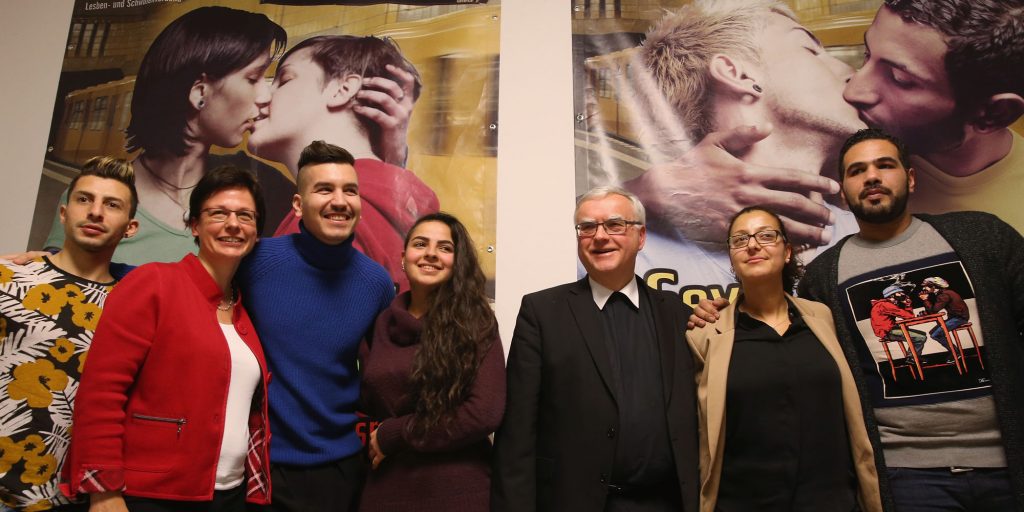
Cultural Change versus Legal Rights
Cambanis: Traditionally, the feminist approach has been posed as a question of legal rights, and at other times, it’s been framed as a cultural struggle to change patriarchal cultural practices.
Sayegh: I don’t work with the legal system at all. I think it’s great that some people have the energy and dedicate their time to working on that, but I don’t think working within this domain alone, without a strong link with social movements, can affect change. I don’t see change as an isolated policy that you modify or a single law that you amend. For me, it’s something that is much more holistic, something that is much more long-term than counting our gains. Obviously, that approach can make it difficult to measure what you do. Sometimes we feel the need to categorize things or tangibly measure our successes. But, I don’t think such quantification goes along with what we are trying to do. So I came to the conclusion that Kohl should mainly work on the discursive level. That might be why some people find us to be overly critical. But we’re not trying to always have the answers. Instead, we want to ask the right questions.
I don’t see change as an isolated policy that you modify or a single law that you amend. For me, it’s something that is much more holistic, something that is much more long-term than counting our gains.
It’s tiring work, because there are less clearly defined goals by which you can measure and present as progress. But we believe in this engagement on a community level that’s not necessarily visible in a mainstream way. And it’s been quite interesting in terms of the discursive work we’re doing and how that work has slowly bled into the community level, especially in queer communities. That’s something we’ve been exploring lately, so we’re not just confined to the limits of a journal and publication restraints. For example, rather than imposing terminologies when doing translation work, we try to work through how certain terms have been used by the communities themselves.
Cambanis: Lebanon, for all its sizable flaws, has a lot of openness to at least talking about some of these communities and their rights. Yet at the same time, there is a hierarchy, and self-defined liberals often care about only a narrow segment of people’s rights.
Sayegh: Not denying a group their rights has now become a rite of passage for civil society organizations. That actually becomes a challenge in single-issue organizing. So while certain single-issue groups may say, “yes, of course there should be rights for everybody,” in their actual work they often fail to take into consideration the interests of other populations. This is what I’m referring to when I talk about structural issues. It’s often the structure of these organizations themselves, which supposedly work on rights for all, that exclude certain communities and populations. Sometimes they say, “we can’t do everything.” But it’s not about doing everything. It’s about having a certain outlook that doesn’t push for one group or one issue at the expense of others.
Cambanis: Could you give an example?
Sayegh: There have been campaigns that promote the Lebanese military protecting Lebanese women. The idea was to talk about women being protected from violence by different factions that are affiliated with the state. However, this glossed over what is happening to migrant populations and how they are being persecuted by those very same people that are being glorified as protectors of women.
Cambanis: So the security forces or the military are portrayed as supporters of women’s rights, when in many spheres they are trampling women’s rights?
Sayegh: Yes, especially those of migrant women. The same thing happened at the first Beirut Pride. At the first Beirut Pride festival, in 2017, the police were thanked for “protecting Lebanese citizens,” verbatim. Of course, that has now changed, since the police canceled the second Beirut Pride. But in 2017, organizers of Beirut Pride even asked the police to be present at events, though they knew that the police had been raiding working-class neighborhoods, hammams, and clubs, and arresting trans refugee women and working class queers.
Religious Authority and the State
Cambanis: We’ve talked a lot about reactionary elements within the state, but we haven’t talked much about religious authorities. Conservative religious leaders from many sects, for instance, came together to oppose civil marriage in Lebanon.
Sayegh: Yes, but I don’t think religious authority in Lebanon is separate from the state. There is no clear separation between the state and the clergy because it is actually religious leaders in power who are resisting such efforts. The law is both secular and religious at the same time. Depending on what set of laws something is falling under, it either follows the secular rule or goes back to the religious tribunals, according to a person’s sect.
Although the religious right-wing is being fought against at the level of civil society, the connection with the state is not being made. So for me, it’s contradictory to fight against religious fundamentalism and right-wing religion, but at the same time to want to be accepted and incorporated into the state. They both need to be fought against using different strategies because they are systems of power that, although not one and the same, often overlap with one another. This needs to be addressed and this needs to be dismantled at any cost. We should not try to belong to a structure that is built on the basis of marginalizing queer, refugee, migrant, and working class populations.
For me, it’s contradictory to fight against religious fundamentalism and right-wing religion, but at the same time to want to be accepted and incorporated into the state. They both need to be fought against using different strategies.
Cambanis: Is there a difference between the kind of threat posed by the authoritarian state versus the kind of threat posed by Islamists?
Sayegh: Yes, of course, there are differences. But I feel like their interests often converge. The state will always back religious demands over civil demands, for example.
Cambanis: Sure. And is there a constituency for any of these rights that you’ve been talking about among religious groups?
Sayegh: Yes, but I think the question is more about religious institutions rather than religious individuals. Of course the personal is political, but that’s for each to deal with on their own and reconcile that side with themselves. The idea is not to alienate people for their beliefs, but to challenge religious institutions and how they are constructed as systems of power that are rooted within the structure of the state. So the main focus, for me, is how religious institutions that work alongside and within the state are involved in the practice of denying rights.
Cambanis: Anecdotally, I can’t really think of any example of a serious active campaign for universal rights coming from an actively religious group.
Sayegh: I think to a certain extent, at least in Lebanon, religious affiliation becomes political. But that’s changing, and I think in universities, student activism is a very ripe area to explore these issues, because they’re really challenging the way we have been thinking about things, especially in terms of religious divides. You can look at what happened with the Gender and Sexuality Club at AUB [the American University of Beirut] when they were verbally attacked by religious figures for doing a queer speed dating night. This happened on Halloween in October, 2018, and they decided to cancel the event—not because of pressure—but because they wanted to ensure the safety of all their members. They were really frustrated by different groups and actors, such as mainstream media and nongovernmental organizations, who were portraying them as having canceled the event because of religious pressure. They actually felt the media frenzy was putting more pressure on them. So in their statement explaining the cancelation, they did talk about organized religion and how it’s distinct from religious individuals. The discourse that came out of it was very interesting. The club managed to distance themselves from a self-victimizing discourse that seeks visibility and mainstream attention at any cost—a discourse we often see in the Beiruti mainstream activist scene—while still challenging religious hegemony and impunity. Again, it’s not about the individuals. In fact, I’ve seen atheists who still follow the political-religious parties that their family is affiliated with.
Cambanis: So, it’s like religious politics without personal piety, which is almost the worst of all worlds.
Sayegh: Yeah, and this is why I was talking about religion taking hold of the state. It becomes an identity issue, and not in a good way. It becomes about different hegemonic groups competing against other groups to preserve their interests as a form of xenophobic politics.
A Time of Uncertain Progress
Cambanis: How have constituencies that are engaged with questions of women and gay rights been affected by the authoritarian resurgence that’s followed the failure of the uprisings?
Sayegh: I think there’s a renewed interest, but that doesn’t mean that there’s progress. We tend to see attention as progress, but I don’t see it as such. I feel that a lot of the nuances are being lost because of these labels being put forth in a very visible and mainstreamed way. For example, while it is not necessarily a bad thing that everybody is talking about gender, the discourse is being kind of diluted. The response to calls for being “gender-sensitive”— already a diluted call that starts from the premise of compromise—has been, for instance, hiring one token woman to a committee. It’s kind of a parody of what feminists have been trying to talk about for years actually. The application of understandings of gender have been very disappointing.
Cambanis: I think Lebanon is in better shape than many countries in the region, but it’s not in good shape.
Sayegh: Well, I think that the circle of people who want to talk about change and who are actively working towards that change is growing. However, even though there is more conversation in the mainstream about sexuality, queer people, etcetera, it hasn’t done much about changing the discourse and how the general population looks at these issues. It’s the same for migration. I don’t think these things can be separated from the conversations about intersectionality, because it is really a way of viewing, understanding, and engaging in politics. I don’t see the change happening fast enough. That’s why I’m thinking about change as a long-term project rather than something I want to see in the here and now.
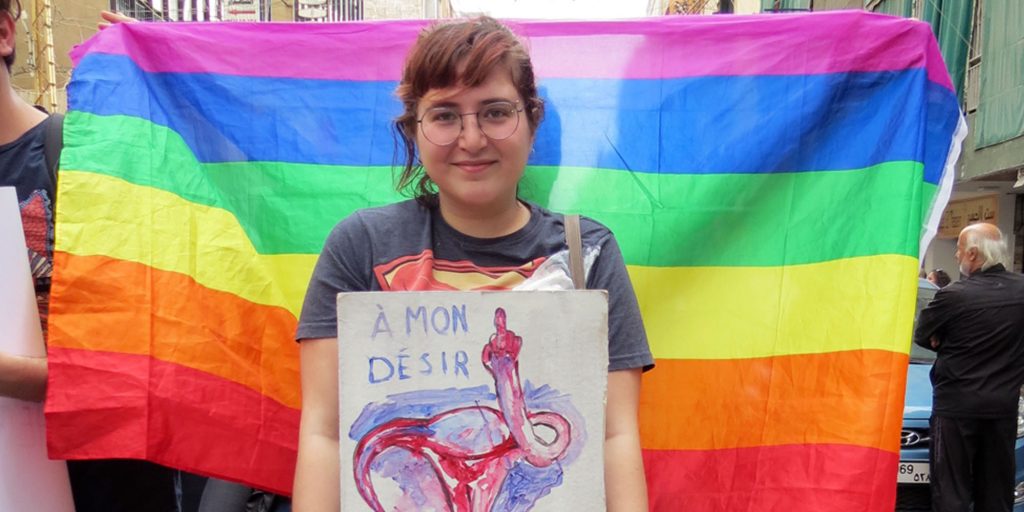
Cambanis: One of the conceptual problems we ran up against a lot in this project is how you promote universal rights without erasing identities and particularity.
When you are talking about something that is universal, you often gloss over the nuances and different power dynamics that exist within this universalism. For me, it’s about finding a balance.
Sayegh: This was my issue with single-issue organizing. When you are talking about something that is universal, you often gloss over the nuances and different power dynamics that exist within this universalism. For me, it’s about finding a balance. I want political principles and visions that are general and global, but that also look at the particularities—the different positionalities, and the different experiences—and value them as legitimate. They are valid in and of themselves, and I try not to impose a general narrative on groups that I’m not necessarily part of.
This transcript has been edited for clarity.
This interview is part of “Citizenship and Its Discontents: The Struggle for Rights, Pluralism, and Inclusion in the Middle East,” a TCF project supported by the Henry Luce Foundation.
